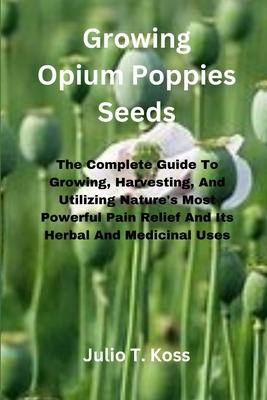
Book
Growing Opium Poppies Seeds: The Complete Guide To Growing, Harvesting, And Utilizing Nature's Most Powerful Pain Relief And Its Herbal And Medicin
(Write a Review)
Paperback
$8.99
The opium poppy plant survives in specific environmental conditions, requiring well-drained soil, ample sunlight, and moderate temperatures to flourish. Cultivating opium poppies involves careful planning and attention to detail, from selecting suitable seeds to managing soil quality and environmental factors.
However, the cultivation of opium poppies is fraught with legal and ethical dilemmas. Opium production is heavily regulated and controlled by international drug laws due to the potential for abuse and addiction associated with opium-derived substances. The cultivation, processing, and distribution of opium and its derivatives are subject to strict legal frameworks aimed at preventing diversion into illicit drug markets and minimizing the risk of substance abuse.
Moreover, the ethical considerations surrounding opium production are complex and multifaceted. While opium-derived alkaloids such as morphine and codeine have significant medicinal value for pain relief and palliative care, they also have a high potential for addiction and misuse. Balancing the legitimate medical uses of opium-derived substances with the risks of diversion and abuse requires careful regulation and oversight.
In addition to legal and ethical concerns, growing opium seeds present practical challenges related to crop management, labor requirements, and security risks. Opium cultivation often takes place in remote and marginalized areas where access to resources and support services may be limited. Farmers engaged in opium cultivation must contend with fluctuating market prices, environmental hazards, and the threat of law enforcement crackdowns.
Despite these challenges, opium cultivation persists in some regions due to economic necessity, cultural traditions, and limited alternative livelihood opportunities. Efforts to address the root causes of opium cultivation often involve promoting alternative crops, supporting sustainable agriculture practices, and providing access to education and economic opportunities for affected communities.
Growing opium seeds are a complex endeavor that requires careful consideration of legal, ethical, and practical factors. While opium-derived substances have valuable medical applications, their production and use must be carefully regulated to prevent diversion and misuse.
The opium poppy plant survives in specific environmental conditions, requiring well-drained soil, ample sunlight, and moderate temperatures to flourish. Cultivating opium poppies involves careful planning and attention to detail, from selecting suitable seeds to managing soil quality and environmental factors.
However, the cultivation of opium poppies is fraught with legal and ethical dilemmas. Opium production is heavily regulated and controlled by international drug laws due to the potential for abuse and addiction associated with opium-derived substances. The cultivation, processing, and distribution of opium and its derivatives are subject to strict legal frameworks aimed at preventing diversion into illicit drug markets and minimizing the risk of substance abuse.
Moreover, the ethical considerations surrounding opium production are complex and multifaceted. While opium-derived alkaloids such as morphine and codeine have significant medicinal value for pain relief and palliative care, they also have a high potential for addiction and misuse. Balancing the legitimate medical uses of opium-derived substances with the risks of diversion and abuse requires careful regulation and oversight.
In addition to legal and ethical concerns, growing opium seeds present practical challenges related to crop management, labor requirements, and security risks. Opium cultivation often takes place in remote and marginalized areas where access to resources and support services may be limited. Farmers engaged in opium cultivation must contend with fluctuating market prices, environmental hazards, and the threat of law enforcement crackdowns.
Despite these challenges, opium cultivation persists in some regions due to economic necessity, cultural traditions, and limited alternative livelihood opportunities. Efforts to address the root causes of opium cultivation often involve promoting alternative crops, supporting sustainable agriculture practices, and providing access to education and economic opportunities for affected communities.
Growing opium seeds are a complex endeavor that requires careful consideration of legal, ethical, and practical factors. While opium-derived substances have valuable medical applications, their production and use must be carefully regulated to prevent diversion and misuse.
Paperback
$8.99